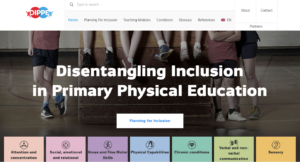Susan Marron, Frances Murphy, Vasiliki Pitsia & Claude Scheuer
This open article reports on Inclusion in Physical Education in primary schools in Europe through the lens of an Erasmus+ partnership in which EUPEA was a partner. The research element, which examined over 1200 teachers’ practices related to inclusion of children with additional needs in primary physical education, found that teachers consider guidance on children’s motor needs and video-based resources particularly useful in supporting them to promote inclusion (Marron, Murphy, Pitsia and Scheuer, 2021). A free online teaching resource resulted in a website Disentangling Inclusion in Primary Physical Education which highlights practices, strategies and resources to support teachers to include all children in primary PE lessons.
Abstract: Using data from the Disentangling Inclusion in Primary Physical Education (DIPPE) Erasmus+ project, this study aimed at investigating teachers’ practices related to inclusion of children with additional needs (AN) in primary physical education (PE) and identifying supports that could enhance these practices.

Responses from 1170 primary teachers across nine European countries to an online questionnaire were analysed. Although inclusion was regarded as important, only 30% of children with AN were reported as being always included and engaged in PE. Teachers considered guidance on children’s motor needs and video-based resources particularly useful in promoting inclusion. Implications of the findings within the DIPPE project and more broadly are discussed.